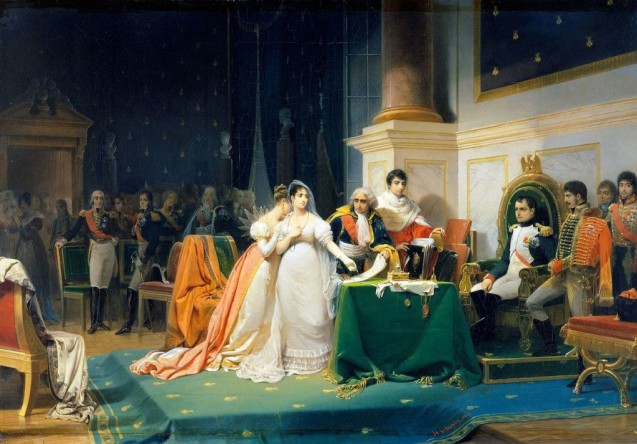Napoleon said it over and over again that the only woman he ever really loved was Josephine. Her real name was Marie-Joseph-Rose de Tascher de La Pagerie, and she was six years his senior. When he first met her, at the end of 1795, she was getting over the loss of her first husband, general Alexandre de Beauharnais (guillotined during the Terror), in the salons of Paris and in the arms of her lovers. To say that Napoleon was head-over-heels in love with her is almost an understatement; she, on the other hand, an experienced woman of the world, gave his emotions a rough ride. They married nevertheless on 9 March 1796. Two days later, Napoleon left to take up command of the Armée d’Italie. From the Italian peninsula, he penned magnificent, and occasionally raunchy, missives. Still not having understood that with a man such as he, she could have an extraordinary future, the flighty new wife took a new lover, played hard to get, and only came to be with her husband in Italy after much insistence. The same game began again when Napoleon was in Egypt – she didn’t even attempt to join him there. On his return, though still passionately in love with her, he threatened to divorce her, but the tears of “sweet and incomparable Josephine”, as he called her, won him round. Their relationship as a couple steadied after he came to power: he became less dependent, and she (possibly) became more loving. The tone of his letters settled: he now wrote to her as “Madame et Chère femme” (Madam, my dear Wife).
That being said, if Josephine could have given Napoleon an heir, he would never have repudiated her as he did, heart-broken, at the end of 1809. She retired to their comfortable Château de Malmaison, with a tidy pension, countless possessions, and the assurance that she could keep her title ‘Empress’. Napoleon even visited her from time to time. And he never hid the love he still had for her. In exile on the island of Elba, he was grief stricken to hear that she had died of a cold on 29 May 1814 and spent several days in a profound melancholy.


